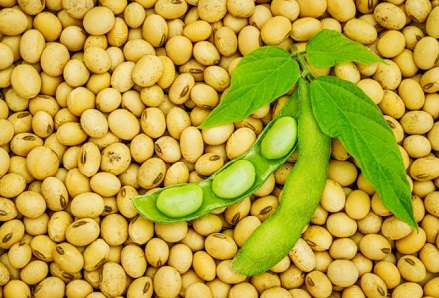Soy Phytochemical Genistein Shows Promise in Halting Prostate Cancer Cell Growth
Nikhil Prasad Fact checked by:Thailand Medical News Team Nov 07, 2024 5 months, 6 days, 7 hours, 42 minutes ago
Herbs And Phytochemicals: A team of researchers from Soonchunhyang University in South Korea has unveiled intriguing findings on the potential of genistein, a phytochemical found in soybeans, in the fight against prostate cancer. This study highlights genistein's ability to halt prostate cancer cell growth, presenting a natural alternative for therapeutic interventions. Prostate cancer, which ranks as a leading cause of cancer-related deaths among men, often requires treatments with harsh side effects. In the search for gentler, plant-based options, this
Herbs And Phytochemicals news report sheds light on genistein’s anticancer effects and its potential as a therapeutic candidate.
 Soy Phytochemical Genistein Shows Promise in Halting Prostate Cancer Cell Growth
How Genistein Affects Cancer Cells
Soy Phytochemical Genistein Shows Promise in Halting Prostate Cancer Cell Growth
How Genistein Affects Cancer Cells
Genistein, an isoflavone naturally found in soybeans, has already gained attention for its antioxidant, anti-inflammatory, and anticancer properties. The study, conducted by Dr. Yoon-Jin Lee and colleagues, investigated genistein’s impact on DU145 prostate cancer cells by observing cell viability, protein expressions, and death markers. The researchers discovered that genistein inhibits the growth of these cancer cells and induces cell death, which they attribute to the compound's influence on multiple signaling pathways within the cell.
Key Study Findings: Genistein and Cell Death Mechanisms
One of the most significant discoveries was genistein's ability to decrease the viability of prostate cancer cells. This reduction in viability was achieved without significantly harming normal prostate cells, an essential factor for any potential therapeutic compound. Genistein was shown to decrease cell survival by inducing apoptosis (programmed cell death), which prevents the uncontrolled growth typical of cancer cells.
To understand how genistein induces apoptosis, the researchers measured the activity of caspase-3 and caspase-7, enzymes crucial for initiating and carrying out cell death. Results showed that genistein increased caspase activity in a concentration-dependent manner. As the concentration of genistein rose, apoptosis indicators like the cleaving of proteins Bax, PARP, and procaspase-3 also increased, demonstrating the compound's ability to trigger cell death specifically in cancerous cells.
Impact on Key Cancer Pathways
Genistein’s effects extended to several cellular pathways known to promote cancer cell survival, including STAT3, ERK, and AKT. These pathways are commonly hyperactivated in cancers, enabling tumors to grow unchecked and resist traditional treatments. By targeting these specific pathways, genistein disrupts the molecular environment that cancer cells rely on to avoid apoptosis and sustain rapid growth.
In DU145 cells treated with genistein, phosphorylated forms of STAT3, ERK, and AKT were significantly reduced. STAT3, a critical factor in cancer cell survival and spread, was especially impacted. Re
duced levels of phosphorylated STAT3 and VEGF, a factor linked to angiogenesis (formation of new blood vessels in tumors), suggest that genistein not only stops cell growth but also curtails the spread of cancer cells. This dual action is promising because it indicates that genistein could potentially inhibit metastasis by blocking the cellular signals that enable it.
Genistein and ROS: Generating Stress in Cancer Cells
The study further revealed that genistein increased levels of reactive oxygen species (ROS) within prostate cancer cells. ROS, while damaging to cells at high levels, are typically kept in check by normal cells’ repair mechanisms. Cancer cells, on the other hand, are more vulnerable to ROS. When ROS levels become too high, they cause mitochondrial dysfunction, leading to cell death. Genistein’s ability to increase ROS within cancer cells without impacting normal cells suggests that it could selectively induce stress and apoptosis in cancer cells, a feature highly desirable in cancer treatment.
Increasing p53 Expression: Another Blow to Cancer Cells
One critical element of the study was observing the effects of genistein on the tumor-suppressor gene p53, which is often inactivated in cancer. In DU145 cells, genistein upregulated p53, a protein known for its role in preventing tumor growth. Higher levels of p53 enhance the cancer cells’ susceptibility to apoptosis. Additionally, the increase in p53’s downstream target, p21, provides further support for genistein’s role in halting cancer cell proliferation. This upregulation suggests that genistein reactivates the cancer-suppressing machinery within the cells, giving them an added push towards self-destruction.
Potential Benefits and Next Steps
These findings position genistein as a potential therapeutic agent in prostate cancer treatment. Genistein’s multi-targeted approach, affecting both the survival mechanisms and metastatic pathways in cancer cells, sets it apart as a promising compound. Its selective effects on cancer cells over normal cells are particularly beneficial, as this minimizes the collateral damage often associated with conventional cancer treatments.
The study concludes that while genistein shows great promise in lab settings, further research is essential to understand its full range of mechanisms and potential in clinical applications. Determining the optimal dosages and delivery methods for reaching effective concentrations within tissues will be crucial for developing genistein as a viable therapeutic option for prostate cancer patients.
Conclusion
In summary, genistein demonstrates potent anticancer effects by inducing apoptosis, disrupting key survival pathways, increasing oxidative stress, and upregulating the tumor-suppressing gene p53 in prostate cancer cells. The compound’s specificity in targeting cancerous over normal cells highlights its potential as a safer alternative or supplement to traditional treatments. As research into plant-based cancer therapies advances, genistein from soybeans could become a valuable tool in the fight against prostate cancer. This study opens the door to further exploration of genistein’s efficacy in clinical settings.
The study findings were published in the peer-reviewed journal: Current Issues in Molecular Biology.
https://www.mdpi.com/1467-3045/46/11/743
For the latest on
Herbs And Phytochemicals, keep on logging to Thailand Medical News.
Read Also:
https://www.thailandmedical.news/news/herbs-and-phytochemicals-daidzein-and-genistein-from-soyabeans-and-equol,-a-gut-flora-metabolite-from-daidzein-can-help-in-prostate-cancer
https://www.thailandmedical.news/news/indonesian-study-finds-soy-based-tempeh-s-isoflavones-can-inhibit-breast-cancer-via-mir-7-5p-upregulation
https://www.thailandmedical.news/news/alzheimer-s-disease-study-shows-tyrosine-proline-dipeptide-derived-from-soy-can-reduce-memory-impairment-in-mice-
